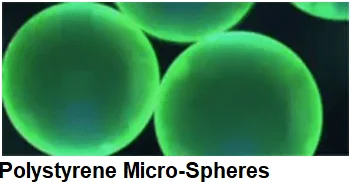Dry Polystyrene Microspheres for Sale
Cleanroom Metrology offers a comprehensive range of Dry Polystyrene Microspheres, also known as Dri-Cal™ Particle Size Standards, serving as the industry benchmark for particle size standards. These highly spherical, NIST traceable particles are essential for applications demanding the utmost precision in contamination control and instrument size calibration. Packaged in convenient 1-gram dropper-tipped vials, our dry microspheres are designed for easy dispensing and aerosolization.
Metrology engineers and research scientists rely on these standards for the calibration of aerosol particle counters, wafer inspection systems (SSIS), and other sensitive analytical equipment. Their narrow size distribution and known optical properties make them ideal for creating reliable challenges in filter testing and for fundamental aerosol research. For enhanced durability, particles with diameters of 200 µm and larger are composed of polystyrene crosslinked with divinylbenzene (PSDVB).

Our catalog features a wide array of sizes, from 200 nanometers up to 1000 microns (1mm), ensuring you can find the particle size standard required for your specific instrument or research protocol. Each lot-numbered vial ships with a Certificate of Calibration and Traceability to NIST and a Material Safety Data Sheet (SDS), guaranteeing quality and supporting your documentation needs. Browse the complete list below to view detailed specifications and pricing for each product. For bulk quantities, please contact our sales team.
Product Part #
Particle Diameter Size
Typical Size Distribution
Concentration
Price
Add to Cart
10 μm
9.2% CV, s = 0.9µm
1 gram, 100% Solids
$595.00
15 μm
5.8% CV, s = 5.6µm
1 gram, 100% Solids
$595.00
20 μm
5.8% CV, s = 5.6µm
1 gram, 100% Solids
$595.00
25 μm
5.8% CV, s = 5.6µm
1 gram, 100% Solids
$595.00
50 μm
5.8% CV, s = 5.6µm
1 gram, 100% Solids
$595.00
70 μm
5.8% CV, s = 5.6µm
1 gram, 100% Solids
$595.00
100 μm
5.8% CV, s = 5.6µm
1 gram, 100% Solids
$595.00
Frequently Asked Questions
What are Dry Polystyrene Microspheres primarily used for?
They are most commonly used as particle size standards to calibrate and validate instruments that measure particle sizes. Key applications include calibrating Scanning Surface Inspection Systems (SSIS) in the semiconductor industry, challenging HEPA and ULPA filters, and conducting aerosol instrument research.
What does “NIST Traceable” mean for these particle standards?
NIST traceability means that the mean diameter of our microspheres has been certified against primary measurement standards maintained by the National Institute of Standards and Technology (NIST). This provides a direct, unbroken chain of calibration, ensuring the highest level of accuracy for your measurements.
How do I choose the right particle size for my application?
The correct size depends on your instrument’s calibration points or the specific particle size you need to detect. For SSIS tools, you typically select a size near the lower sensitivity limit of the tool. For aerosol counters, you should select sizes that challenge the specific channel ranges you wish to verify.
Are these dry particles suitable for suspension in liquids?
While optimized for dry powder and aerosol applications, they can be suspended in aqueous solutions. To create a stable, monodisperse suspension, we recommend using deionized water with a small amount of surfactant (e.g., Tween 20) and using a vortex mixer or sonicator to ensure proper dispersion.
How can I minimize static electricity when handling the dry powder?
Dry polystyrene is an insulator and can build up static charge. To minimize this, work in an environment with controlled humidity (40-60% RH). Using an anti-static gun or ionizing bar near the work area is also highly effective. When transferring powder, do so slowly and steadily to reduce friction.
What is the shelf life and proper storage condition for these microspheres?
When stored properly in their sealed, original container at room temperature and away from direct sunlight, our dry polystyrene microspheres have a shelf life of at least 24 months. Proper storage ensures the stability of the polymer and prevents clumping.
How do these polystyrene standards differ from silica standards?
Polystyrene microspheres have a refractive index of ~1.59 and are suitable for most applications involving visible light or standard lasers. Silica microspheres have a lower refractive index (~1.46) and higher durability, making them the preferred standard for calibration with high-power UV and Deep UV (DUV) laser systems where polystyrene might absorb energy or degrade.
Are there any specific safety precautions for handling dry microspheres?
While polystyrene is generally non-toxic, the dry powder is very fine and can become airborne. We recommend handling the particles in a well-ventilated area or under a fume hood to avoid inhalation. Standard personal protective equipment (PPE) such as gloves, safety glasses, and a lab coat is advised. For detailed information, please refer to the product’s Safety Data Sheet (SDS).
Does each vial come with a Certificate of Calibration and Traceability?
Yes, every vial of our NIST traceable particle size standards ships with a Certificate of Calibration and Traceability. This document provides the mean diameter, measurement uncertainty, and direct traceability to NIST standards, which is essential for quality control and regulatory compliance.
Do you offer custom particle sizes or bulk quantities?
We can accommodate requests for custom sizes and provide bulk quantities for larger-scale industrial or research needs. Please contact our sales team directly to discuss your specific requirements, and we will be happy to provide a quote and lead time.